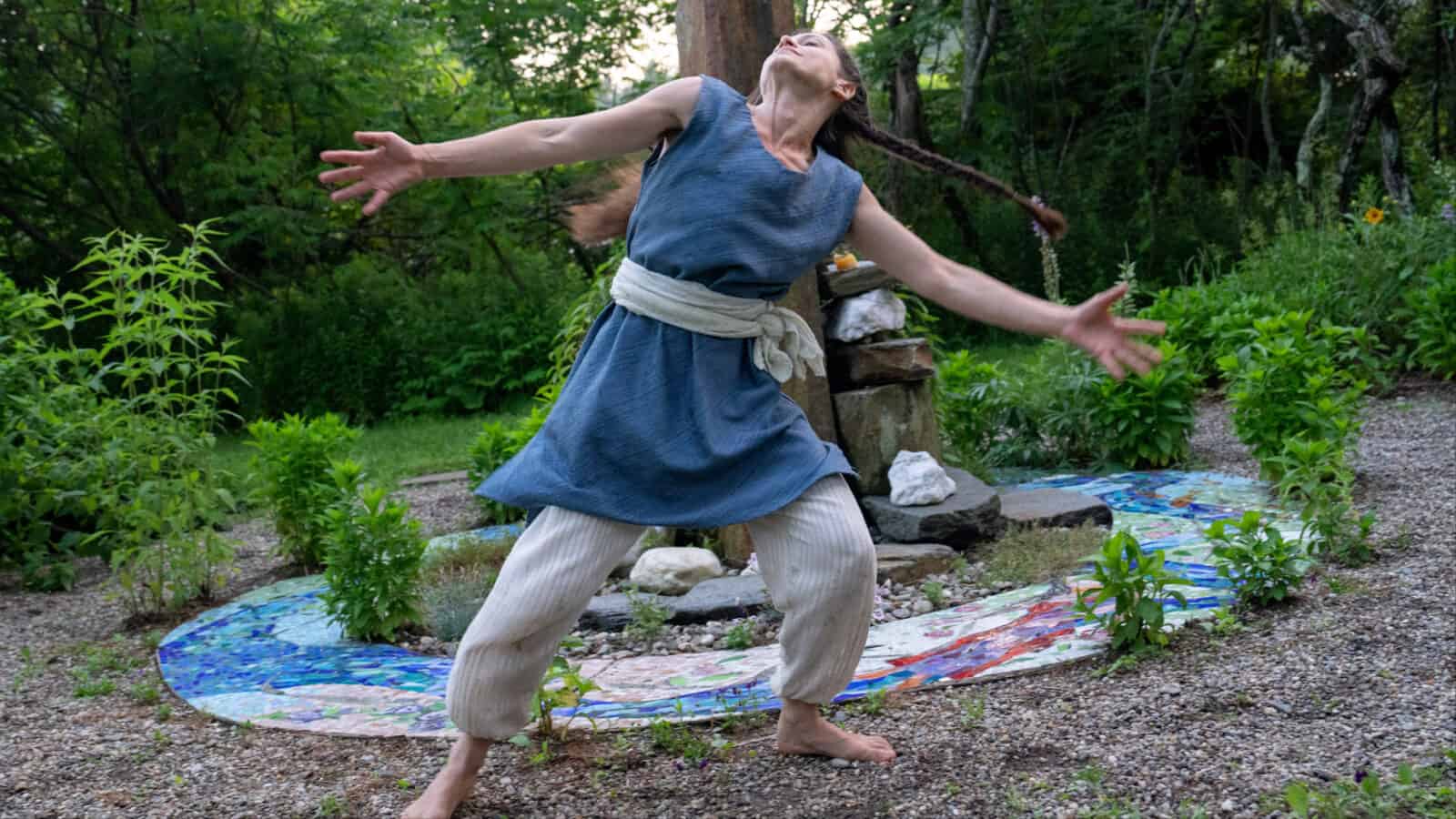Women are singing in the river. They are wading in the water from the temple garden to the labyrinth, and they call and respond over the heartbeat of a drum. In their bare feet, they are walking on holy ground.
Dionysos is dancing in the mountains on a summer night. The god of orchards and fruit, fertility and wine, choreography and theater has come home, and with them women have gathered from around the world — women who know the mysteries of their mind. They form a community who hold each other in faith and ritual, freedom and ecstasy.
Through August 2, Double Edge Theatre in Ashfield performs The Hidden Territories of the Bacchae, directed by Stacy Klein. In an old farm on the ridge, they create stages in the woods and fields, and even on the barn roof and in the pine trees.
They have drawn the seed of their work from Euripides’ ancient Greek play, The Bacchae, said co-artistic director Milena Dabova, who plays Dionysos, and they are composing their own transformative work, imagining stories that should have been told. In Euripides’ play, the Bacchae never speak, even though the play is named for them. What will happen when they do?
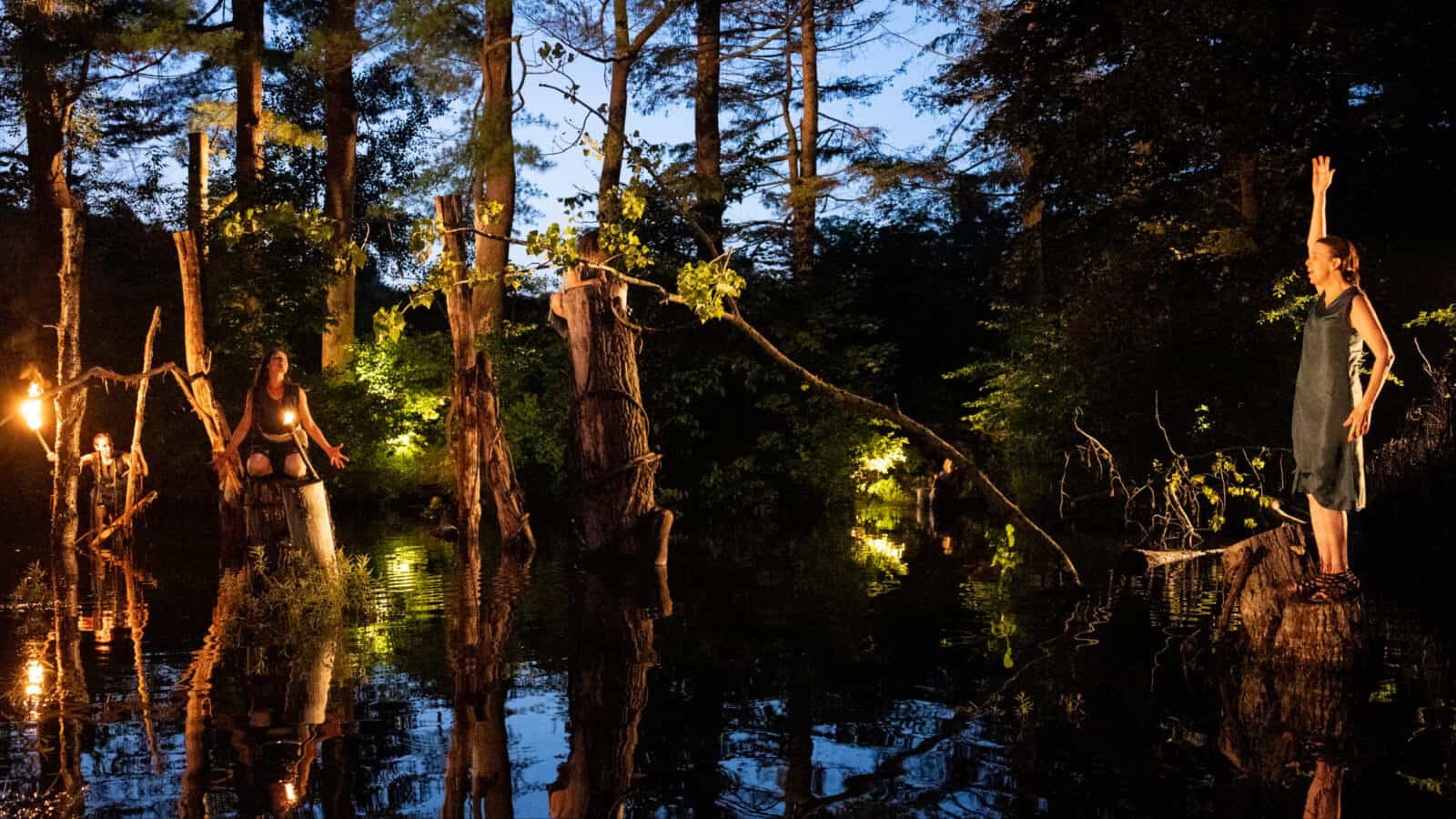
The Bacchae sing along a river ringed with torches at Double Edge Theatre. Press photo courtesy of the theatre
Tonight Desire Graham is singing, inspired by West Africa, Ur and Babylon. Tomantha Sylvester, Double Edge artist and hospitality director, lifts an Ojibwe song of praise, and Mica Farias Gomez plays the djembe drum.
The actors who play the Bacchae here are weaving in their own stories, Dabova said. All of the artists are delving into their own ancestral histories and connections to ritual.
“I bring my voice, rhythms, music from my cultural heritage,” Gomez said. “In all this journey, this performance, I’m bringing my own story, in my music and in my body too. What I play on the instruments are rhythms, fragments of rhythms that are familiar to me.”
‘I bring my voice, rhythms, music from my cultural heritage. In all this journey, this performance, I’m bringing my own story, in my music and in my body.’ — Mica Farias Gomez
She composes and performs her own music for the show, reaching out to Cumbia dance tempos, Argentine chacharera, music from her Native roots in Argentina and from her Jewish roots. At times, she will chant from the Song of Songs and Hebrew prayer.
“Like almost all Latin Americans, we are a great mix,” she said, “so I sing in Hebrew and play with what melody of that song inspires me. My wandering as a musician makes me able to use different rhythms.”
Argentine and Latin American music is polyrhythmic, she said, a fusion of African music that enslaved peoples brought with them, Indigenous music and European.
“… from all of this, different rhythms are born, very syncopated and rich in terms of textures and colors … Those inspired rhythms in turn all have a dance.”
“I compose the music and songs of my character based on what the director is looking for in conjunction with the musical director Amanda Miller — the musical composition in this performance is a communion, where I propose what is mine within a certain context where sometimes the music already exists and other times we have to find and compose it.”
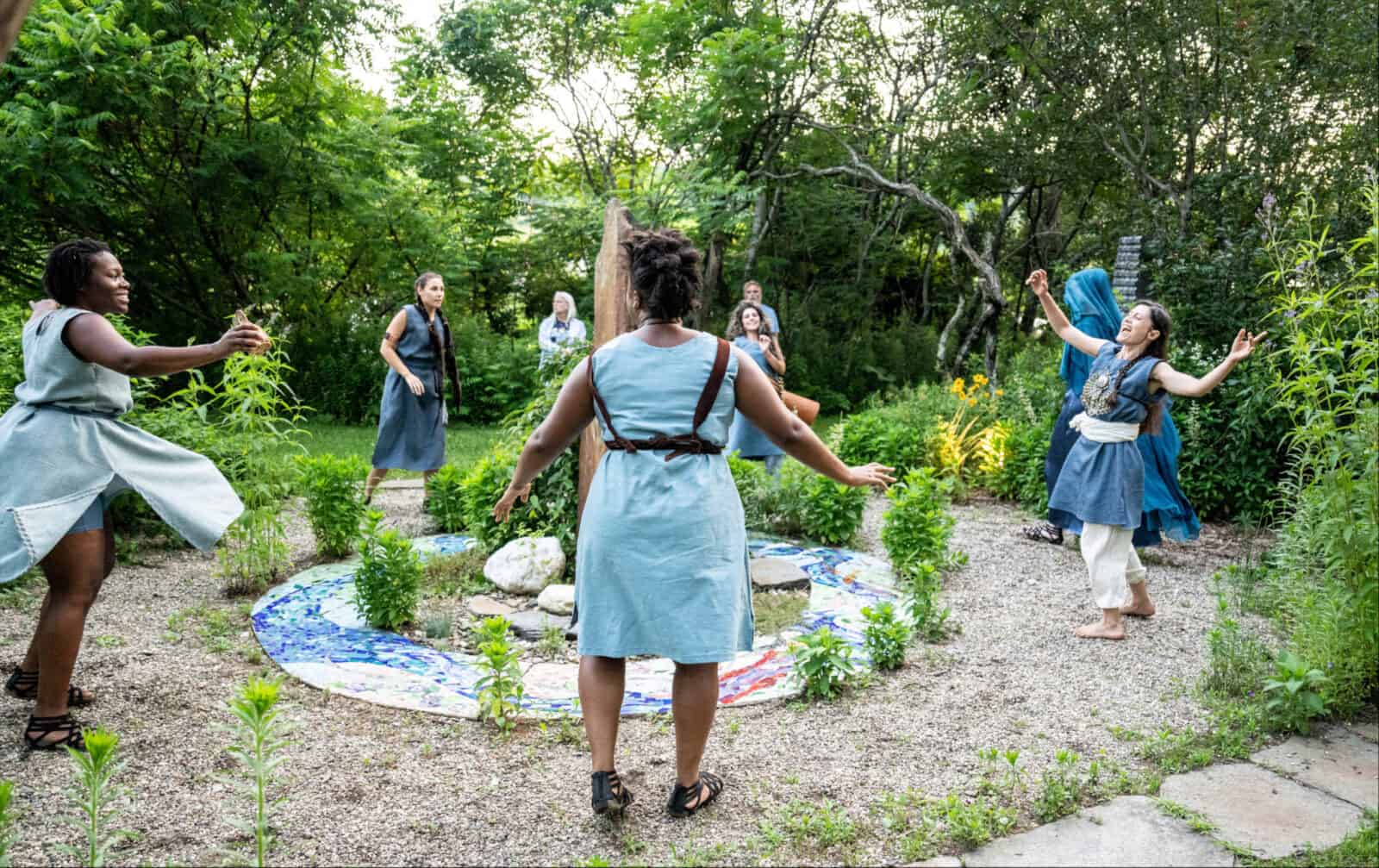
The Bacchae sing and perform in the garden of Semele at Double Edge Theatre. Press photo courtesy of the theatre
As Dionysos, Dabova sings in her own native language, in Bulgarian. Dionysos and the Bacchae embody for her an inner freedom, she said, and a connection with the earth, an understanding that part of being human is being one with nature.
She sees that relationship reflecting throughout the play in intuitive and dreamlike storytelling. The action begins beside a sculpture of stone petals — they open outward, and in the dark the stamens will appear out of flame. The flower is a fire pit — a pyre for Pentheas, king of Thebes. The play will begin at the end of the story, Dabova said, with his death and mourning, and spin backward to the events that have led here.
They spark as Dionysos comes home to Thebes, the city where they were born, where their cousin is king. They are coming to honor their mother, Semele. Dionysos never knew her, Dabova explains. Semele died before they were born.
She is earthborn, half human, and she became pregnant by a god. Her sister, Agave, demanded proof of the father, Dabova said, and Semele asked Zeus to reveal himself to her — he appeared as lightening in a storm, and she died. But he took her unborn child into his own body until the baby could be born.
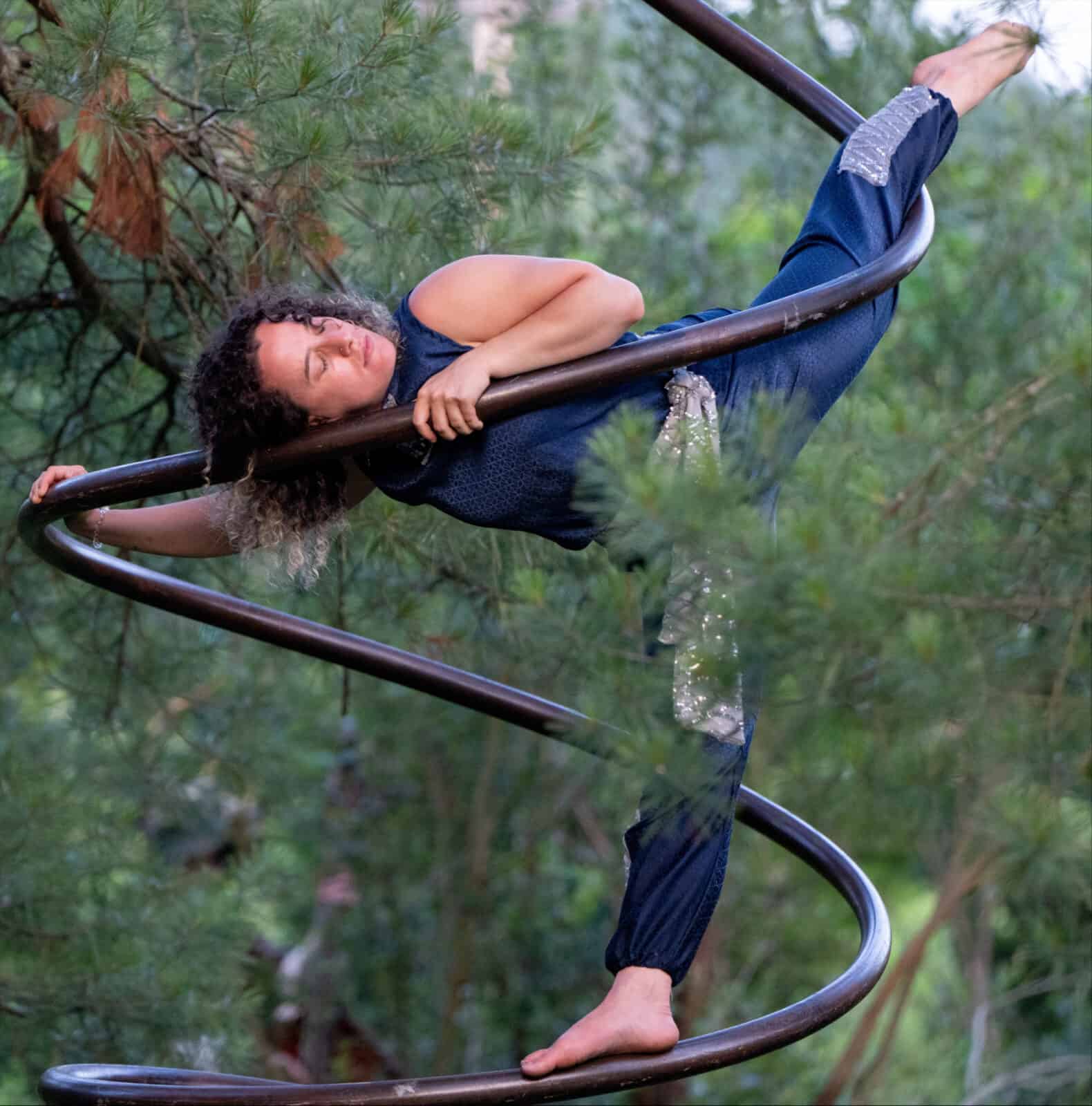
A dancer performs in a spiral sculpture in Hidden Territories of the Bacchae at Double Edge Theatre. Press photo courtesy of the theatre.
So Dionysos grew up in the mountains, with the spirits of the trees and the water, and now, when they come to their mother’s city, they bring the faith they have created. And the king of Thebes does not want people to accept these rites, Dabova said. He is Dionysos’ cousin, and he sees them as a challenge.
In their meeting, the play explores the tension when human fear and anger and greed conflict with natural systems and ways of being, Sylvester said. In Penthias, she sees the violence of a way of thinking that takes from the earth without counting the cost — sees the ecology of living beings only as resources to plunder and people as servants and slaves.
In the voices of the Bacchae, she hears a story of rematriation. Dionysis and the women who celebrate with them are learning and discovering connections with the earth and with each other.
In her own voice, she is bringing Ojibwe customs, she said. She wears regalia and sings songs she has created in her own language, in Anishinaabemowen. The Ojibwe are leading a revitalization of their language now, she said, and she has been speaking in it often in this production.
Her people have deep ties to this land, she said. In one song, she blends the words of an Ojibwe teaching of the seven prophecies that hold the story of her people’s migration journey from the Eastern woodlands to the Great Lakes, as Europeans came and forced them from their homelands.
“We used to live on the East Coast,” she said. “The first prophet said we needed to head West because colonization was coming.”
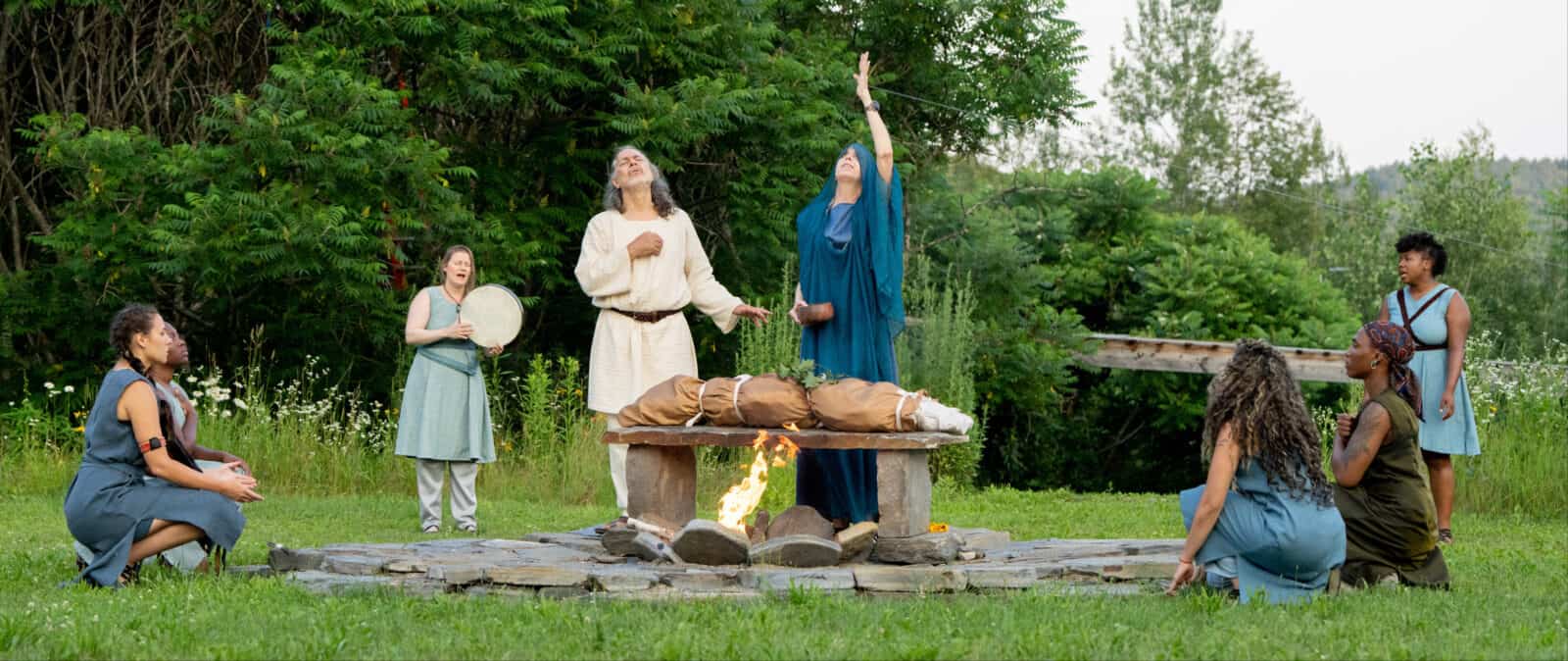
The Bacchae and the people of Thebes light a pyre at Double Edge Theatre. Press photo courtesy of the theatre
She fuses this story with a song that honors the bear and eagle, she said. She is of the bear clan and looks to the being, as a source of strength and medicine and protection. She describes elements of her regalia, all of them beautiful and skillfully made and imbued with meaning. Around her upper arms she is wearing crimson armbands set with porcupine quills.
“We wear armbands to honor those who have passed on,” she said, “especially in times of massacre, something that takes the lives of many people. I decided to wear these to honor whoever has fallen because of the negative effects of the patriarchy and loss of matriarchy.”
At her hip she wears a medicine bag that has come to her as a gift. An element so sacred and honored will usually come down through families in a direct line. In a bag like this one, someone might carry knowledge and elements of faith and meaning. They might hold herbs to heal mind, body and spirit. They might carry sweetgrass, the fragrant plant her people call the hair of mother earth.
In their own play, she and her fellow performers re-imagine the rites of the Bacchae in ways that feel vital to them today. They tap unfathomable, deep aspects of a person, Dabova said, and the freedom that comes with being expansive in themself.
In Thebes, Dionysos brings a new vision of life and comes up against the city’s limited views. Agave chafes under lifelong restrictions, Dabova said. Penthias tries to assert his authority and ban the rites of the Bacchae from the city.
Graham recognizes truth and tension among the ancestral voices she is honoring with her music. She has looked for wisdom from the woman known as the earliest known writer in the world. Five thousand years ago, around 2300 BCE, Enheduanna, a Sumerian high priestess in the city of Ur, wrote a hymn to Inanna, goddess of love, power and fertility.
Graham hears Enheduanna calling, I praise you, I want to praise you on principle, and my life is falling apart — why me, when I am most devoted to you?
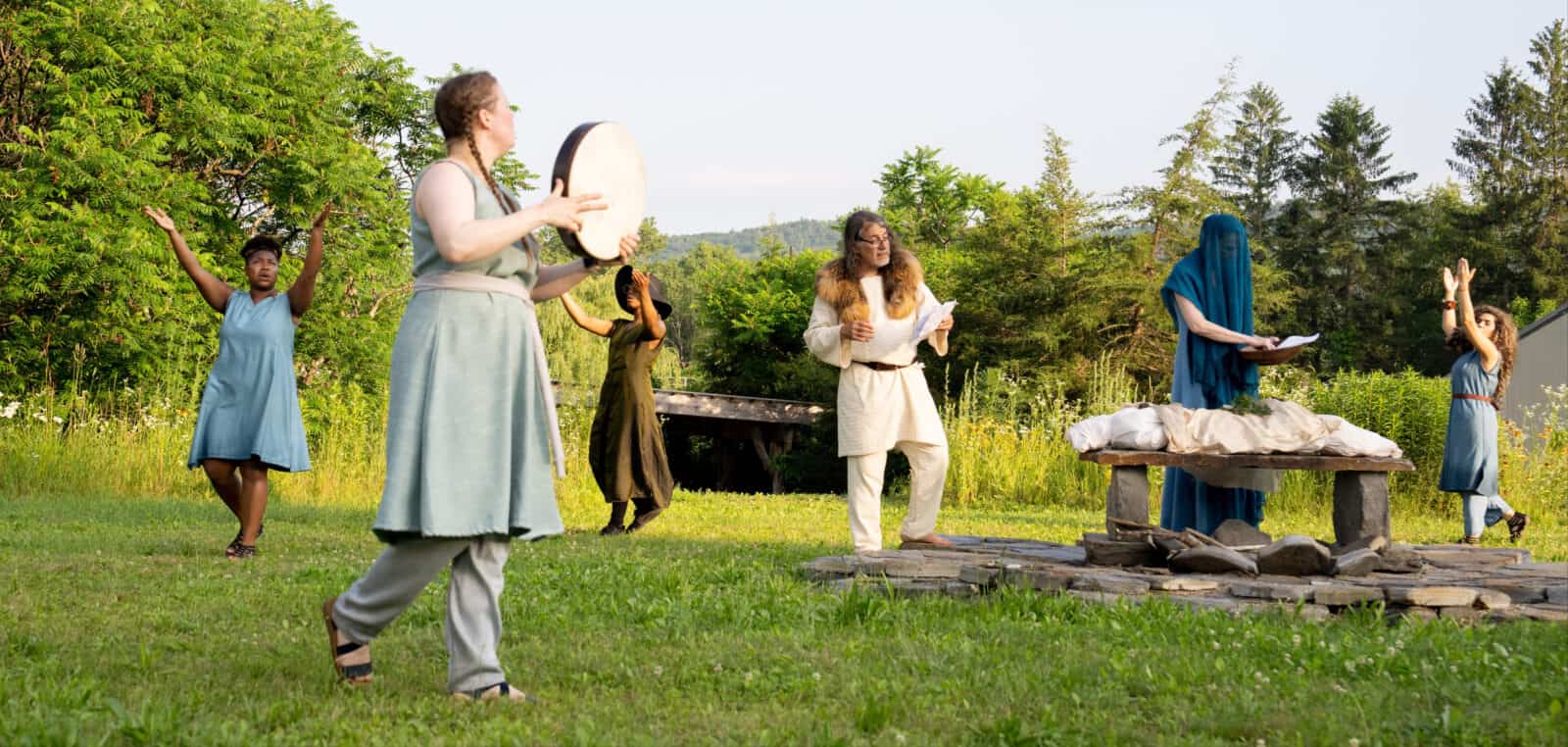
The Bacchae and the people of Thebes play music and dance at Double Edge Theatre. Press photo courtesy of the theatre
Graham has felt this kind of tension in her own life, she said. She feels it in the effort to support forms of activism, like ecological and environmental movements, when many of the leaders in the U.S. are white, and she may share the movement’s ideals and at the same time feel pressure against her from many people in the group.
The Bacchae are reclaiming their strength in the land and in the people they love. In the temple of Semele, an ancestral garden of native plants, they will weave together individual and collective ancestral music and stories, Dabova said, and new compositions with ancient Greek influences.
Flute and cello sound over running water and birdsong. Swallows dip over the fields at dusk. Dabova finds it humbling to create a work like this, outdoors. This is her 14th summer here, she said, and the elements can affect all the company can do, sometimes without warning.
She feels an indelible effect in performing within touch of the trees, feeling grass on bare feet, and river water, breathing the scents in the air. Movement and aerial elements become central in the work, she said — actors speak from the pine trees and dance with sculpture and artwork from local artists.
As she sings a folk song, above her Ucee Nwachunwu (a collaborating artist working with Double Edge) climbs and performs on a pole on a barn roof, swingng themself upward with lithe acrobatic grace, torquing their body, arcing against the sky. And around them, the Bacchae travel down the river, shaping past and future in their music and in their bodies, walking a labyrinth in a meadow under the night sky.

